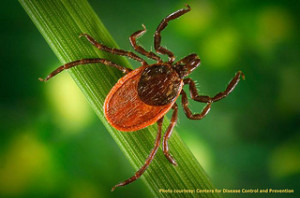How to Protect Your Pet From Ticks
By Chris Williams on July 10, 2015.

We live in Lyme disease country and we have partly wooded property. We’re careful to use repellent and do tick checks, but I worry about our dog. He stays in our yard but he does go outside and it’s really impossible to check in his long hair for attached ticks. Is there any way to protect him from ticks? L.L., Pinardville, NH
First, you should talk to your veterinarian about your options. There are various sprays, dips, shampoos, collars, and topical treatments to help control ticks. You are probably already using something on your dog for fleas. There is apparently also a pet vaccination for Lyme disease that is available but it has certain limitations and does not protect from other tick diseases.
It’s true that the blacklegged ticks that transmit Lyme disease are hard to see, even on people. They are some of our smallest ticks, particularly when they are in the larval or nymphal stage. Engorged ticks that have fed are larger and easier to see and remove on a dog, but they may have already transmitted disease when feeding.
Create A Tick-Free Margin Around Your Yard
Besides following your veterinarian’s advice regarding protective products, there are some steps that you can take around your property to help reduce your dog’s exposure to ticks. Ticks are most common in the area where open lawn meets woods or brush. If you can keep your family and your pets out of that high-risk border zone, you will reduce the numbers of attached ticks.
One step would be to keep your dog away from the wooded margins of your property by keeping him restricted to the lawn with a fenced area, electronic fence, or restraints. If that’s not possible, you can try to create a tick-free margin around your lawn by installing an edge border. Clean up litter and brush in this zone and make a 3-foot wide border between your lawn and the woods with wood chips, mulch or gravel (see Creating a Tick-Free Zone in Your Yard – Advice From the Pros).
Eliminate Mice and Other Small Animals From Your Yard
Anything that you can do to reduce the numbers of mice, voles, chipmunks, and other small mammals on your property will help reduce ticks since the immature ticks feed on small animals while the adult ticks feed mostly on deer. However, any stage will also feed on people and pets. Trim high grass and weeds, clear dense brush, remove wood and brush piles, and manage bird feeders, for starters. See How to Keep Ticks Out of Your Yard for more tips.
For further protection for your family and your dog, have a professional exterminator apply a pesticide barrier around your lawn and in places that your dog frequents to intercept, kill, and protect your pet from ticks in these areas. An exterminator can also get rid of rodents on your property. Give Colonial Pest a call today because blacklegged ticks are active right now.